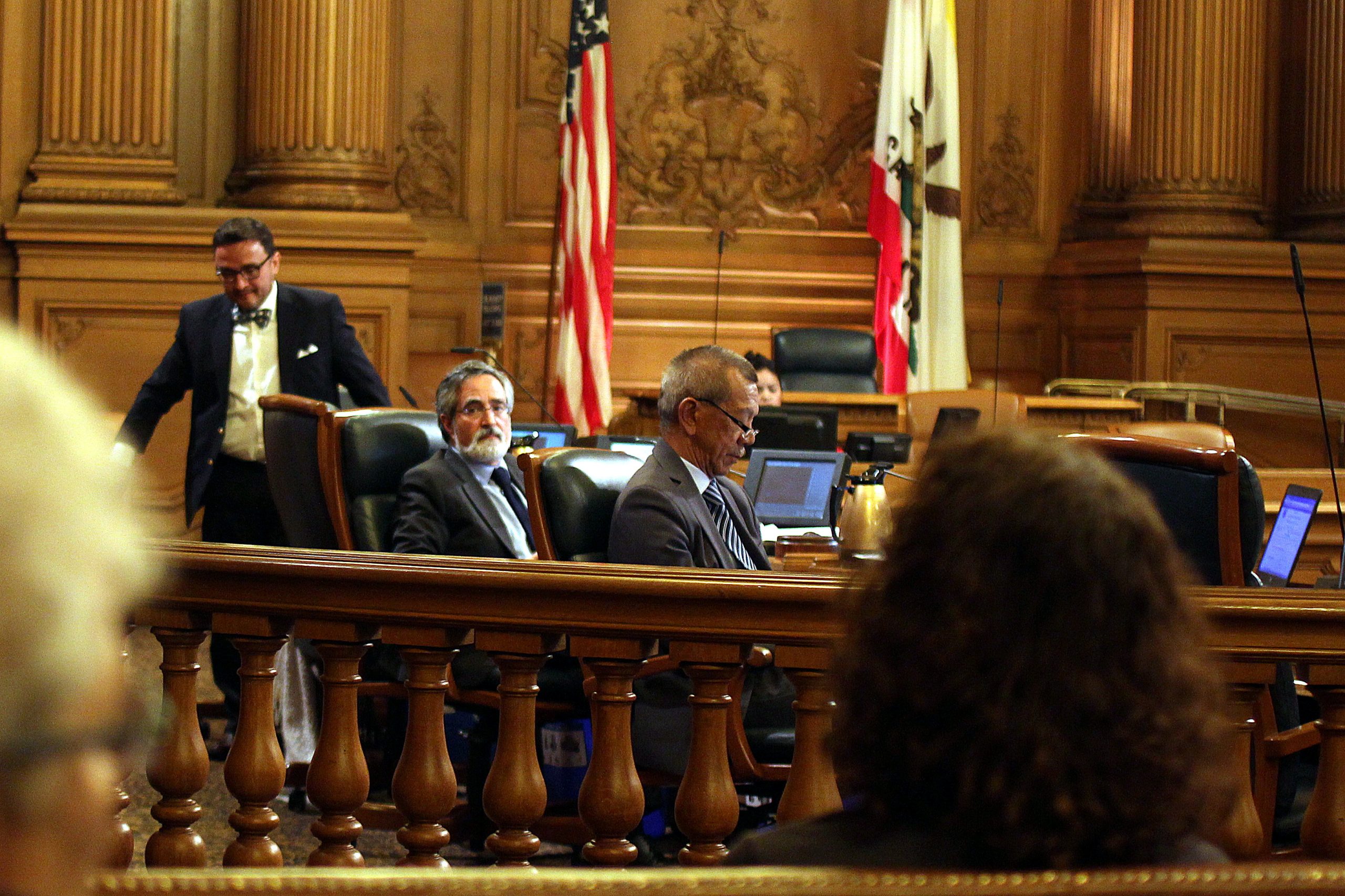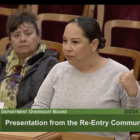UPDATE (6/28/2016): Airbnb has sued the city over the Board of Supervisors’ recent changes compelling the home-sharing giant to police and block unregistered hosts. The San Francisco-based company argues that the revisions to the short-term-housing rental law violate the Communications Decency Act, the Stored Communications Act and the First Amendment. In a press release Monday explaining its lawsuit, Airbnb recommended ways to fix the registration process as an alternative to fining platforms to boost host compliance.
Blamed in part for the city’s shortage of affordable housing, home sharing in San Francisco got a little more complicated on Tuesday — and a lot riskier for both hosts and companies like Airbnb.
The Board of Supervisors gave final approval to new rules that would force several thousand unregistered hosts to register their homes or apartments with the city or be barred from posting on Airbnb and its smaller competitors. The board also put the burden of policing unregistered hosts on these rental sites.
Previously, compliance with the city’s short-term rental law, which took effect February 2015, rested squarely on the hosts, who could be fined for not registering with the city. Now, hosting platforms also face fines of up to $1,000 a day for each unregistered listing.
Both were key components of Proposition F, which voters defeated last November. Airbnb spent more than $9 million to scuttle the ballot initiative.
The measure, passed Tuesday on a veto-proof 10-0 vote, now goes to Mayor Ed Lee, and could take effect by mid-July, barring possible legal action.
Airbnb is expected to challenge the regulations in court. Some experts say the new obligations may run afoul of the U.S. Constitution and federal statutes that protect websites from liability for its users’ content.
An estimated 5,000 San Francisco residents or property owners have been flouting the regulations the past 16 months. They must now sign up with City Hall or forgo the extra cash from renting their rooms, apartments or homes on these sites.
According to recent data from Inside Airbnb, 6,518 hosts are running the 8,441 San Francisco listings on the company’s site. Yet, only 1,324 addresses have been legally registered with the Office of Short-Term Rental, the Planning Department agency responsible for enforcing the regulations.
As the city has stepped up enforcement, fines for hosts have become less of a threat and more a reality.
Office director Kevin Guy said his team has pursued 558 investigations so far this year, levying $750,000 in fines to the hosts of 245 unregistered listings. And his team has gotten better at tracking illegal activity: Guy estimates roughly half of the office’s current investigations arose from complaints, down from 92% in the last year, according to a Budget and Legislative Analyst report.
The new law would compel thousands of hosts to go through the city’s complicated registration process, which has drawn criticism from some residents who have already signed up. In an amendment, Supervisor Scott Wiener added his voice to those calling for registration to be streamlined.
No one can rent a unit or any portion without a registration number from the Office of Short-term Rental. Prospective short-term-rental hosts must be permanent residents or tenants, meaning they live in the unit for at least 275 days each year. Besides registering, hosts must obtain a San Francisco Business Registration Certificate, obtain or have proof of $500,000 liability insurance, and have no city code violations.
Airbnb criticized City Hall for cracking down on unregistered listings without “offering any real solutions to fix a complex process” described as “broken” in a statement last week.
“An estimated 1,200 San Franciscans avoided foreclosure or eviction by hosting on Airbnb, and this legally-questionable proposal puts their housing at risk without offering any real solutions to fix the complex process,” the statement said.
The San Francisco-based company, valued at about $25 billion, added that it was “considering all options to stand up for our community and keep fighting for real reform.”
Dale Carlson, who was the campaign manager for Proposition F, called the new ordinance “the heart of Prop F.”
“We didn’t get involved in the Airbnb issue in order to win a campaign. We got involved to solve a problem,” Carlson said. “The campaign was a way to do it. The other way was legislatively, and we couldn’t do it until the complexion of the board changed,” a reference to the election of Supervisor Aaron Peskin to his old District 3 seat.
He said that Airbnb’s concern was that if the platform was limited to listing only properly registered hosts, “80 percent of their business would be wiped out. If other cities do the same thing, they’re in a world of hurt. Their $25 billion valuation will evaporate.”
Airbnb will likely challenge the law for violating several legal doctrines, most notably Section 230, a federal law that protects online platforms from being held responsible for user-generated content. In 2012, Section 230 was used to take down a law holding websites accountable for third-parties advertisements of child pornography.
“The courts said that legislation was using a back-door methodology of putting the hosting platforms in the position of verifying third-party content — and you can’t do that,” said Eric Goldman, a law professor at University of Santa Clara in an interview with the San Francisco Chronicle.
But Carlson believes the city’s short-term rental law is defensible. “So do the city attorneys of San Francisco, Chicago and Los Angeles,” he said.
In the major debate over how San Francisco should regulate short-term rentals, from the creation of the office last July to the rejection of Proposition F in November, a registration process tangled in red-tape has been blamed for lagging compliance. Those complaints surfaced again when an earlier version of the law made its debut June 2 at the Government Audit and Oversight Committee.
“I stood in three different lines and spoke with three different people. It took about an hour,” said host Edward Bell during public comment, describing his mandatory in-person appointment at the Office of Short-Term Rental last August.
Bell, 64, also called the city’s website “intimidating for someone who is not on the computer all day. People my age do email and that’s about it.” He said it took him half an hour to realize a required form had to be printed out online and mailed in.
Alix Rosenthal, a vice chair of the San Francisco Democratic County Central Committee, said she waited two months for her registration number. Airbnb contributed $2,500 to her re-election campaign, according to Mission Local.
Another host, Doug Nielsen, said the entire registration process takes “at least three months or more.”
Adding to the confusion: Airbnb’s website contains an outdated infographic describing the city’s original registration process.
But Guy said significant improvements have been made since the system was “implemented from scratch” last summer.
“I think a lot of folks who were commenting were people who registered in the very early days,” he said, referring to the June 2 committee hearing.
Among the changes: the office is now open after regular business hours. Registration tables are set up during community events throughout the city. In-person meetings have been shortened from one hour to roughly 20 minutes, and the office aims to review most applications within three weeks. Hosts can now report their rental activity, mandatory every three months, on the office’s website.
Guy said more online features to simplify compliance will be rolled out in the next couple of months.
But at the June 7 full board meeting, Wiener signaled it was not enough. He pushed an amendment holding Guy’s team accountable for recommending new laws to streamline the process. The board adopted Wiener’s amendment and gave its initial approval.
It is still unclear what new legislation under this amendment could do to simplify registration.
“We want to hear from the experts on this. The Office of Short-Term Rental are the ones who are interacting with the hosts,” said Wiener’s legislative aide Jeff Cretan.
In the days prior, legislative aides to Supervisors David Campos and Aaron Peskin, who co-sponsored the legislation, and Supervisor Norman Yee, who was on the committee that drafted the law, also suggested that improving the registration process was best left under the office’s discretion.
Though the office was created by Mayor Lee as a “one-stop” shop to meet short-term rental regulations, forms required to host legally are housed in three different buildings.
Before applying for a registration number from the Office of Short-Term Rental, hosts must receive a business license from the city’s tax agency. Under state law, all businesses must then file a 571 tax form with the city’s property assessor. Guy said this fragmentation is due to state-level taxpayer privacy laws.
Though the amendment asks the Office of Short-Term Rental to suggest new city legislation for streamlining its process, changing state laws is beyond what the Board of Supervisors could do. Furthermore, the amendment specifies that recommendations should be based on expediting and simplifying the “application process,” not necessarily tax compliance.
However, aspects of the original law could incidentally streamline the process by waiving the in-person appointment for some applicants. The Office of Short-Term Rental would be able to verify that hosts reside in San Francisco — rather than perpetually rent out their properties from afar — by demanding sites to hand over listing data such as names, addresses and recorded rental activity within one business day.
“With the ability to check into and verify the data that’s being submitted on our application, we would have a little more comfort not meeting face-to-face,” Guy said.
In addition, it soon may be possible to file required tax forms online, according to Vivian Po, the Office of Assessor-Recorder’s executive assistant.
The 571-R for short-term rentals cannot be filed online, while the 571-L for other businesses, like retail stores and restaurants, can be. Not enough 571-R forms have been submitted in recent years to warrant an e-filing system, Po said. The proposed law might change that by forcing thousands of San Francisco hosts to comply.
The San Francisco Examiner reported that Lee is worried the law will not survive legal challenge, in which case hosts might not be compelled to register with the city. Airbnb circulated an e-mail petition on June 1, calling the measure “legally questionable” for conflicting with “important federal laws that protect internet privacy.”
In response, a city attorney questioned by co-sponsor Supervisor Campos at the meeting Tuesday said there is no legal threat because the law regulates business activity, not user-generated content.
To host legally with the city, applicants usually wait five to six weeks for a registration number that is only valid for two years. They must file for a business license, collect documents to prove their residency and meet city officials in person. A tax form listing all items available to potential renters, from linens to kitchen chairs, must be filed annually.
In comparison, signing up for Airbnb requires a device with internet connection. The one-time registration takes about an hour, depending on how detailed hosts wants their listing to be. The last step? Reading through paragraphs in small print describing San Francisco’s short-term rental laws, before clicking “Finish.” It’s also free.
Given the stark differences in ease, speed, and convenience, along with rumors of an arduous registration process from its early days, the law could discourage hosts from using sites like Airbnb at all.
In a city with skyrocketing living costs, losing this extra income might mean moving out, some residents say.
Renting out a spare room allowed Bell and his wife to keep their home of 33 years, in the city he’s called home since he was 5 years old.
“If it weren’t for Airbnb, I wouldn’t be standing here right now,” Bell said.










